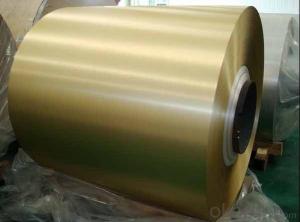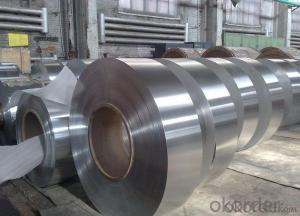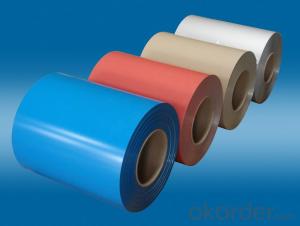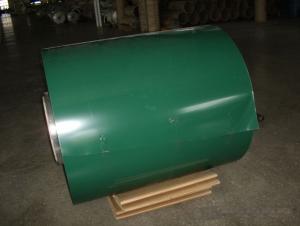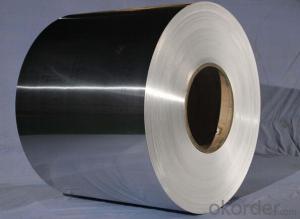Coil Aluminum Roll for Coated Aluminium Garage Door
- Loading Port:
- Shanghai
- Payment Terms:
- TT OR LC
- Min Order Qty:
- 2 m.t.
- Supply Capability:
- 50000 m.t./month
OKorder Service Pledge
OKorder Financial Service
You Might Also Like
Specification
Coated Aluminium Coil/Roll For Aluminium Garage Door
Description
Alloy | 1060, 1100, 3003, 8011, etc. |
Temper | H16, H18, H24, H26, H28 |
Thickness | From 0.05mm to 3.0mm |
Width | Standard width:1240mm |
Special width:1300mm, 1520mm, 1570mm, 1595mm | |
Diameter | Standard dia:1200mm |
Interior dia:150mm,405mm,505mm | |
Weight | 2.5 T/coil,3.0 T/coil |
Coating | PE, PVDF, ACRYLIC |
Surface | Embossed, mill finish, coated |
Color | AS to code RAL |
Gloss | 10-90%(EN ISO-2813:1994) |
Coating Thickness | PE: more than 18 micron |
PVDF: more than 25 micron | |
Coating Hardness(pencil resistance) | More than 2h |
Coating adhesion | 5J (EN ISO-2409:1994) |
Impact Resistance | No peeling or cracking(50 kg/cm,ASTMD-2794:1993) |
Flexibility(T-bend) | 2T |
MEK resistance | More than 100 |
Advantage | 1.High temperature resistant 2.Weathering resistant 3.Scrubbing resistant 5.Acid or alkali proof 6. Fireproof 7.Light weight material is easy to construct and install |
Out package | Wooden splint with export standard |
Application | ACP, wall cladding, facades, roofs and canopies, ceilings, signboards, blind window, display platforms, electrical panels, etc |
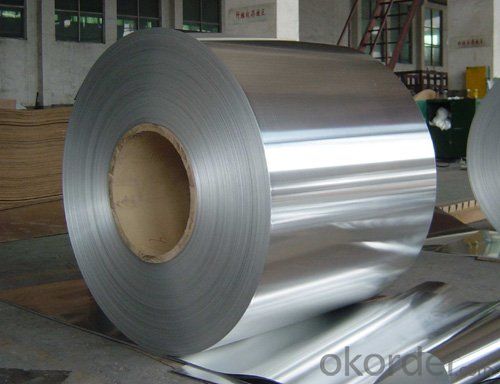
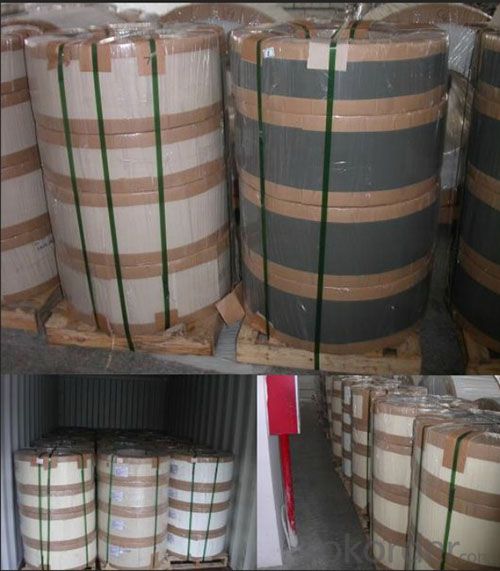
Manufacturing
Decoiler → Accumulator →Tension Leveler →Acid & Alkali Cleaner → Rinse →Conversion Treatment → Priming coater →Infrared Curing Oven →Main coater →Floatation Curing Oven →Strippable Film Applicator → Exit Accumulator → Recoiler
FAQ
--Q: Do you provide free samples?
--A: Yes, free samples will be sent to you on freight at destination.
--Q: Can I get your latest products catalogue?
--A: Yes, it will be sent to you in no time.
--Q: What is the MOQ?
--A: 2 tons
--Q: What are your payment terms?
--A: We accept L/C, T/T.
--Q: What kinds of alloy can you supply?
--A: 1000 series: 1050, 1060, 1070, 1100, 1145, 1200
3000 series: 3003, 3004, 3105, 3104
5000 series: 5052, 5083, 5754, 5182
6000 series: 6061, 6063, 6062, 6063
8000 series: 8011, 8021
--Q: What kinds of temper can you supply?
--A: O-H112: O,H12,H14,H16,H18,H22,H24,H26,H,32,H34,H111,H112
T3, T4, T6
- Q: I have a muffin pan made of aluminum foil and I do not know if i can put it in the oven to cook some muffins. Many sights say it will melt but they say that about putting a sheet of foil at the bottom of the oven for a long time. I just want it to be in their for half an hour to make muffins.
- Aluminum Foil In Oven
- Q: Can aluminum coils be used for food processing conveyor systems?
- Yes, aluminum coils can be used for food processing conveyor systems. Aluminum is a durable and lightweight material that is resistant to corrosion, making it suitable for food processing environments. Additionally, aluminum is non-toxic and does not react with food, ensuring the safety and quality of the processed products.
- Q: What are the best rust-proof coils? Please tell me the model and manufacturer in Shangdong. Thank you.
- 3003 aluminum coil, AL-Mn series alloy, is the most widely used rust-proof aluminum with the density being 2.73. It is applicable to insulation projects such as pipe insulation, packaging, machine parts, refrigerator, air conditioning and ventilation pipes and other wet environment.
- Q: Can aluminum coils be used in automotive manufacturing?
- Yes, aluminum coils can be used in automotive manufacturing. Aluminum is a lightweight and versatile material that offers various advantages in the automotive industry. It is commonly used to make parts like body panels, engine blocks, wheels, and heat exchangers. The use of aluminum coils in automotive manufacturing allows for improved fuel efficiency, as the reduced weight of the vehicle contributes to lower energy consumption. Additionally, aluminum has excellent corrosion resistance, making it suitable for use in various weather conditions. Overall, the use of aluminum coils in automotive manufacturing provides numerous benefits, making it a popular choice for many car manufacturers.
- Q: I have the Samp;W Mamp;P 15 rifle and was wondering if I should oil the exterior of the rifle. The receiver material is 7075 T6 Aluminum and the finish is Hard Coat Black Anodized (specifications on website). Any advice or tips are welcome! Thanks!
- aluminum is different from steel, it does rust (oxidize) but once it does the oxidation protects it from further rust! unless freshly scratched or gouged, all aluminum surfaces are covered wit ha near-invisible layer of aluminum oxide (rust) that acts like a barrier against further corrosion. anodizing is a type of aluminum finish that strengthens the natural barrier of aluminum oxide to make it more acid resistant. no oiling is necessary to keep anodized finishes in good shape. the only stuff you have ot watch out for with aluminum is mercury. mercury will destroy aluminum beyond repair. but since the mercury bans about 20 years ago accidentally spills of mercury on your gun isn't very likely... mercuric corrosive primer soot will not damage your gun.
- Q: This question asks about potential safety hazards when using electric heaters that have aluminum coils.
- <p>While electric heaters with aluminum coils are generally safe when used properly, there are some safety concerns to consider. Aluminum can heat up quickly and may become very hot, posing a risk of burns if touched. Additionally, aluminum coils can corrode over time, potentially leading to electrical shorts or fires. It's important to ensure that the heater is not covered or obstructed, as this can cause overheating. Always follow the manufacturer's instructions for use and safety precautions. Regularly inspect the heater for any signs of damage or wear, and never use a heater with a damaged cord or plug.</p>
- Q: Can aluminum coils be used in power generation facilities?
- Aluminum coils are indeed suitable for use in power generation facilities. Aluminum, being a highly conductive material, offers numerous benefits for power generation applications. Its exceptional thermal conductivity allows for efficient heat transfer from the coils, a critical factor in cooling systems within power generation facilities. Moreover, aluminum's lightweight nature simplifies handling and installation, setting it apart from metals such as copper. This lightweight attribute also contributes to cost savings by reducing overall equipment weight. Additionally, aluminum's corrosion resistance is particularly valuable in power generation facilities, which frequently operate in challenging environments. In conclusion, considering their conductivity, thermal efficiency, lightweight nature, and corrosion resistance, aluminum coils present a feasible choice for power generation facilities.
- Q: Consider the following ionization energies for aluminum:Al(g) → Al+(g) + eI1 = 580 kJ/molAl+(g) → Al2+(g) + eI2 = 1815 kJ/molAl2+(g) → Al3+(g) + eI3 = 2740 kJ/molAl3+(g) → Al4+(g) + eI4 = 11,600 kJ/mol A) Account for the trend in the values of the ionization energies.B) Explain the large increase between I3 and I4.
- aluminum forms an ion by loosing electrons. once an electron is lost, the nucleus attains net positive charge. as a result, the remaining electrons are strongly held by nuclea force of attraction, hence more energy is required to remove them.
- Q: Are aluminum coils suitable for roofing applications?
- Yes, aluminum coils are suitable for roofing applications. Aluminum is a lightweight and durable material that offers many advantages for roofing projects. It has excellent corrosion resistance, which is important for protecting roofs from weather elements such as rain, snow, and UV radiation. Aluminum is also non-combustible, making it a safe choice for roofing applications. Additionally, aluminum coils are highly malleable, allowing for easy shaping and installation on various roof designs. They are also available in a wide range of colors and finishes, providing aesthetic options for different architectural styles. Overall, aluminum coils are a popular choice for roofing due to their durability, versatility, and aesthetic appeal.
- Q: What is the difference between aluminum plate and aluminum coil?
- A sheet is flat, one by one for storage, one for coil material, one roll for storage, but aluminum coil can be leveled by machine, that is aluminum plate.
Send your message to us
Coil Aluminum Roll for Coated Aluminium Garage Door
- Loading Port:
- Shanghai
- Payment Terms:
- TT OR LC
- Min Order Qty:
- 2 m.t.
- Supply Capability:
- 50000 m.t./month
OKorder Service Pledge
OKorder Financial Service
Similar products
Hot products
Hot Searches
Related keywords
